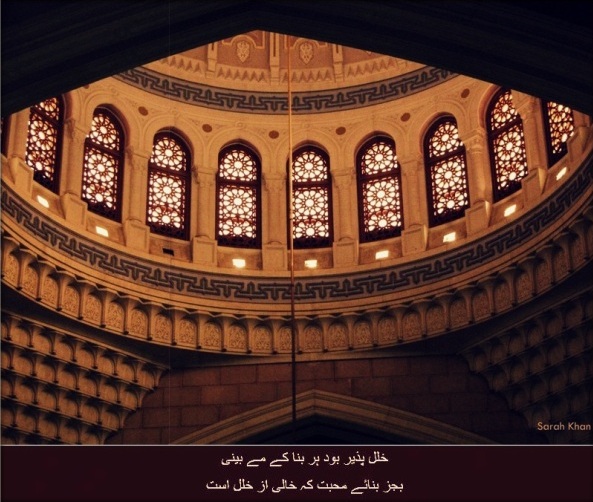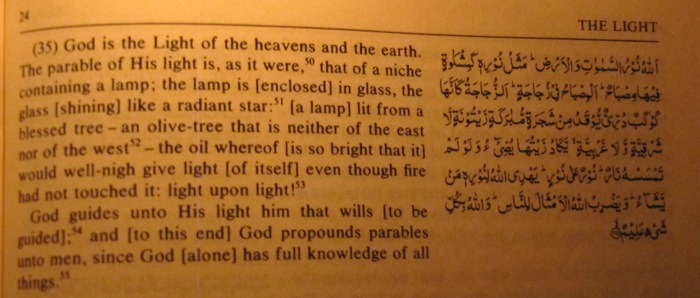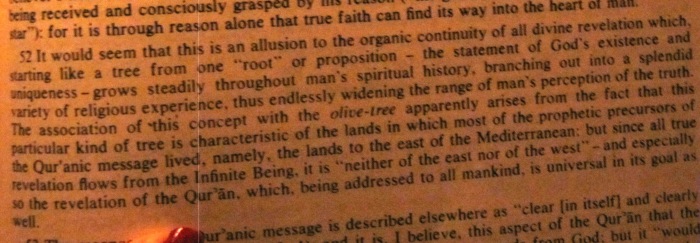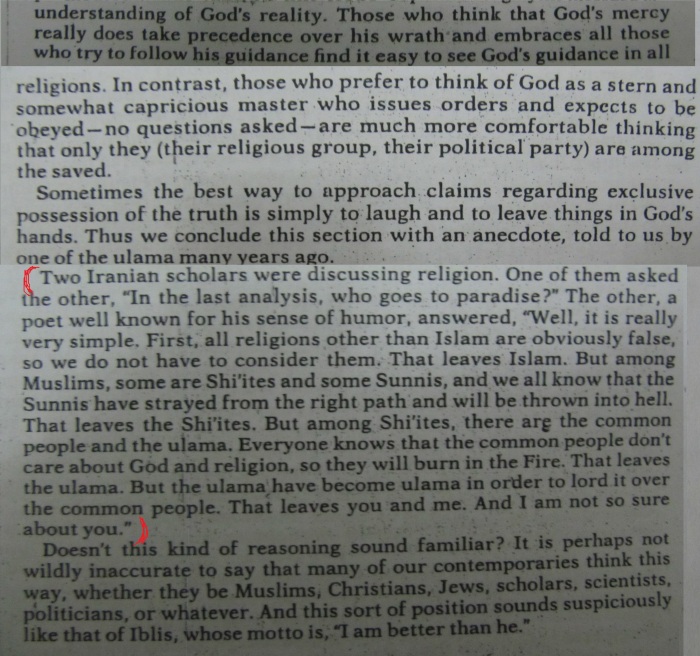
Today I was looking at Chaper 24 al-Nur (The Light) in the Quran, when I came across this verse. Verse no. 35:

This verse analogizes God to Light, emanating from an ‘olive-tree that is neither of the east nor of the west’. Neither of the east nor of the west, I thought, is a curious phrase which must be reflected upon. Footnote 52 explains this phrase:

I find this explanation so important and so beautiful that, I believe, it deserves to be reemphasized. ‘Neither of the east nor of the west’ is “an allusion to the organic continuity of all divine revelation which, starting like a tree from one ‘root’ or proposition – the statement of God’s existence and uniqueness – grows steadily throughout man’s spiritual history, branching out into a splendid variety of religious experience, thus endlessly widening the range of man’s perception of the truth.” This reminds me of a fascinating idea based in perennial philosophy which likens all religions to different cascades of water issuing forth from the same Divine Order, illustrated by Seyyed Hossein Nasr in Religion and the Order of Nature, and by Lord Northbourne in Religion in the Modern World. Once, in one of my classes of Religion and World Politics, the professor asked us as to what do we think about our religion Islam’s position in relation to other religions. To answer this, I cited my favourite verse from the Quran (5:48).
“And to you We have revealed the Book containing the Truth, confirming the earlier revelations and preserving them. So judge between them by what has been revealed by God, and do not follow whims, side-stepping the truth that has reached you. To each of you We have given a law and and a way and a pattern of life. If God had pleased He could surely have made you one people. But He wished to try and test you by that which He gave you. So try to excel in good deeds. To Him will you all return in the end, when He will tell you of what you were at variance.” (Quran 5:48)
This verse expounds the timeless principle that Islam confirms the Truth that came before it, and if God had wanted He could have made you into one people, but He gave a different law and a different way of life to different people; so they will be judged according to what has been given to them. Meanwhile everyone should try to excel in good deeds. I find this particular verse to be of immense significance because of three very crucial claims inherent in it: i) God admits that Islam does not hold a monopoly over Truth. ii) If He wanted He could have made everyone alike but He preferred to preserve a considerable degree of heterogeneity, diversity in the world, iii) Instead of nitpicking and squabbling over whose version of truth, or whose way of life is superior, one must introspect and focus on his own good deeds. Furthermore, I also cited this fascinating analogy based in ‘philosophia perrenis’ which I referred to before. The mystical school of Islam also subscribes to this belief: All religions are like cascades of water gushing forth from the Spring of the Unity on the mountaintop (God). They are all similar in that they are all composed of water, but each has a different form and a different trajectory. There may be correspondences between different streams but there are never exact repetitions. All cascades originate from the Spring on the top and none from each other. The oneness of their origin is the source of similarities found between them, and the different terrains and trajectories on which they flow reflect their differences. Moreover, “only at the Spring Itself are all the cascades one and nowhere else should complete unity be sought among them” (Nasr 13). This, I believe, entails that the more God-conscious one is, in terms of this analogy the closer one is to the Top, the more one realizes the conception of these cascades gushing forth from One Spring, and the more affinity one is bound to feel towards them – all of them. I remember my professor added that life is too short to try to make one cascade fall into another; just embrace all of them as they are for and respect them for where they come from. An idea all the more pertinent in our society which is still faced with the reprehensible instances of forced conversions. The same idea is explained by Muhammad Asad in the inserted footnote above: “organic continuity of all divine revelation which, starting like a tree from one ‘root’ or proposition – the statement of God’s existence and uniqueness … branching out into a splendid variety of religious experience.” I feel even if one is not a devout believer in matters pertaining to metaphysics or religion, this analogy is a touching, beautiful exemplification of the intrinsic bonds of affinity present between humankind, despite all the differences in the outer forms. Jalal al-din Rumi illustrates similar concept in the following couplet and states that peace can be possible with the realization of meaning – the essence – beyond forms. “The difference among creatures issues from forms (surat), When one reaches the world of meaning (ma’na) there is peace.” – Masnavi
So if all religions are branching out from one root, then which Religion is true anyway? And from the vantage point of God, how much does it matter? What if the essence of all of them is the Truth? That is the essence: the meaning, beyond forms. A variety of religious traditions growing out of God’s existence “endlessly widen the range of man’s perception of the truth,” to quote Asad. William C. Chittick writes that many Quranic verses leave “plenty of room for openness towards other religions. The position Muslims take on this issue depends largely on their own understanding of God’s reality” (174). It is interesting to believe that the way you conceive God is largely reflected in how you treat His creation. If you believe that God, being Al-Wudood, emanates Love, or if you believe “God is love” (1 John 4:8 and 1 John 4:16b), you will naturally embrace all his creation, with the same love, regardless of the faith.
Seyyed Hossein Nasr writes in Traditional Islam in the Modern World : “To melt the hardened heart into a flowing stream of love which would embrace the whole of creation by virtue of love for God is to perform the alchemical process of solve et coagula inwardly: a ‘work’ which is none other than an inner battle (jihad) against that which the soul has become, in order to transform it into that which it ‘is’ and has never ceased to be if only it were to become aware of its own nature.” In this extract, he implies that the original tendency of human soul is to ’embrace the whole of creation by virtue of love for God’, and, interestingly, one of the hues of jihad is to rediscover the natural tendency to embrace and love amid the distorting forces that have caused the soul to become what it is not: incapable of embracing whole of God’s creation.
In the end, here is a relevant passage out of Sachiko Murata and William C Chittick’s The Vision of Islam, Chapter: Islam and Other Religions, I just read. The parenthesized anecdote will leave you with a smile (at the reductionist folly of those who believe everyone besides them is damned).
